Verbal Warning Letter
[Your Name]
[Your Title/Position]
[Company Name]
[Company Address]
[City, State, Zip Code]
[Date]
[Employee's Name]
[Employee's Address]
[City, State, Zip Code]
Subject: Verbal Warning
Dear [Employee's Name],
I hope this letter finds you well. I am writing to address a matter of concern that has come to our attention regarding your job performance and conduct. As an essential part of our team, it is crucial that we work together to maintain a positive and productive work environment.
Over the past few weeks, we have observed the following issues:
1. [Specify Performance Issue #1]
2. [Specify Performance Issue #2]
3. [Specify Behavioral Issue #1]
4. [Specify Behavioral Issue #2]
5. [Any other relevant issues]
These issues have been brought to your attention in one-on-one discussions, but we have not seen the expected improvements. As a result, I find it necessary to issue you a formal verbal warning regarding these matters.
It is essential for you to understand that your performance and behavior not only affect your own work but also have an impact on the overall efficiency and morale of the entire team. We believe in providing our employees with every opportunity to succeed, and it is in that spirit that we offer this verbal warning.
We expect to see immediate and sustained improvement in the areas mentioned above. To help you overcome these challenges, we recommend the following steps:
1. Take some time to reflect on the areas where improvement is needed and identify specific actions you can take to address them.
2. Seek guidance and support from your supervisor or colleagues if you encounter difficulties in any aspect of your job.
3. Utilize any available resources or training programs to enhance your skills and knowledge related to your role.
Please note that failure to make significant progress in addressing these concerns could result in further disciplinary action, up to and including termination of employment.
Your success as an employee is important to us, and we believe you have the potential to overcome these challenges. However, it is essential that you take this warning seriously and make immediate efforts to rectify the issues outlined in this letter.
If you have any questions or require any clarification, please do not hesitate to reach out to me. Let's work together to ensure a positive and successful work environment.
Sincerely,
[Your Name]
[Your Title/Position]
[Company Name]
General Verbal Warning Letter
Subject: Verbal Warning Regarding Conduct
Dear [Employee Name],
This is to formally notify you that during our recent discussion on [Date], we addressed certain behavior that does not meet company expectations. While this serves as a verbal warning, it is crucial to correct these actions immediately to avoid further disciplinary measures.
We expect you to review your conduct and ensure compliance with company policies going forward.
Sincerely,
[Manager Name]
[Position]
Casual/Informal Verbal Warning Message
Subject: Friendly Reminder About Workplace Conduct
Hi [Employee Name],
Just a quick note following our chat today about [specific issue]. Please make sure to adjust your behavior in these situations to stay in line with team standards.
We’re confident you can make the necessary improvements.
Thanks,
[Manager Name]
Serious Professional Verbal Warning Letter
Subject: Verbal Warning Notice
Dear [Employee Name],
During the review on [Date], we discussed performance and behavior concerns, particularly [describe issues]. This verbal warning serves as an official notice that any recurrence will lead to further disciplinary action, including written warnings or suspension.
Please acknowledge this warning and take immediate steps to rectify the concerns discussed.
Regards,
[Manager Name]
[Position]
Provisional Verbal Warning Email
Subject: Provisional Verbal Warning
Dear [Employee Name],
This message serves as a provisional verbal warning regarding [issue]. Consider this an early notice, giving you an opportunity to correct the matter before further action is considered.
Please take this seriously and demonstrate immediate improvement.
Best,
[Manager Name]
Creative / Heartfelt Verbal Warning Message
Subject: Important Conversation About Workplace Behavior
Hi [Employee Name],
I wanted to personally touch base regarding our recent discussion on [specific issue]. Your contribution to the team is valued, but certain behaviors need to be adjusted to maintain harmony and productivity.
I trust you will take this to heart and make the necessary changes.
Warm regards,
[Manager Name]
What / Why of a Verbal Warning Letter
A verbal warning letter is a formal notification given to an employee to address behavior or performance that does not meet organizational expectations. Its primary purpose is to:
- Inform the employee of the concern
- Encourage immediate corrective action
- Serve as a documented reference for future disciplinary measures if required
- Maintain professional standards within the workplace
Who Should Send a Verbal Warning Letter
- Typically sent by the direct manager or supervisor
- HR personnel may also issue the warning, especially for sensitive issues
- The sender should have authority over the employee’s role and performance evaluation
Whom the Verbal Warning Letter Should Be Addressed To
- The employee exhibiting problematic behavior or poor performance
- In cases of group issues, it may be addressed to multiple employees
- Sometimes copied to HR for documentation purposes
When to Issue a Verbal Warning Letter
Situations that may trigger a verbal warning include:
- Repeated lateness or absenteeism
- Unprofessional conduct in the workplace
- Failure to meet performance targets
- Breach of company policies
- Minor safety violations
- Early-stage conflicts with colleagues
How to Write and Send a Verbal Warning Letter
- Identify the issue clearly and objectively
- Use neutral and professional language
- Keep the letter concise and to the point
- Choose the mode: in-person discussion followed by a letter or direct email/message
- Document the discussion date and key points
- Include expectations and next steps
Formatting Guidelines for Verbal Warning Letters
- Length: Short, generally 1–2 paragraphs
- Tone: Professional, serious, yet constructive
- Style: Formal for documentation; casual or friendly for informal messages
- Mode: Email or printed letter depending on context
- Etiquette: Be clear, respectful, and avoid emotional language
Requirements and Prerequisites Before Sending a Verbal Warning
- Verify the facts and incidents
- Review company policies for appropriate procedures
- Prepare notes from the discussion
- Ensure the employee has been given prior informal feedback if applicable
- Determine whether a witness (manager or HR) should be present
After Sending / Follow-up Actions
- Document the warning in the employee’s file
- Schedule follow-up meetings to assess improvement
- Monitor behavior or performance
- Determine if escalation is needed (written warning, suspension)
- Provide guidance and support to help the employee improve
Tricks and Tips for Effective Verbal Warning Letters
- Always remain factual, avoid subjective language
- Mention specific dates and incidents
- Keep a calm, professional tone to avoid conflict
- Use the letter as a reference for future actions
- Encourage feedback from the employee to ensure understanding
Common Mistakes to Avoid
- Being vague about the issue
- Using aggressive or emotional language
- Not documenting the discussion
- Issuing a warning without prior informal notice (when possible)
- Failing to outline clear expectations for improvement
Elements and Structure of a Verbal Warning Letter
- Subject line indicating warning
- Greeting
- Explanation of the issue or behavior
- Reference to previous discussions or expectations
- Instructions for improvement
- Closing with signature and designation
FAQ About Verbal Warning Letters
Q: Is a verbal warning legally binding?
A: It is a formal notice and part of documentation but typically not a legal action on its own.
Q: Can a verbal warning be escalated?
A: Yes, if the issue persists, it can escalate to written warnings or other disciplinary measures.
Q: Should the employee acknowledge receipt?
A: Ideally, yes. This ensures they understand the warning and its implications.
Q: How many verbal warnings should be given before a written warning?
A: Usually 1–2 verbal warnings suffice, depending on company policy and severity of the issue.

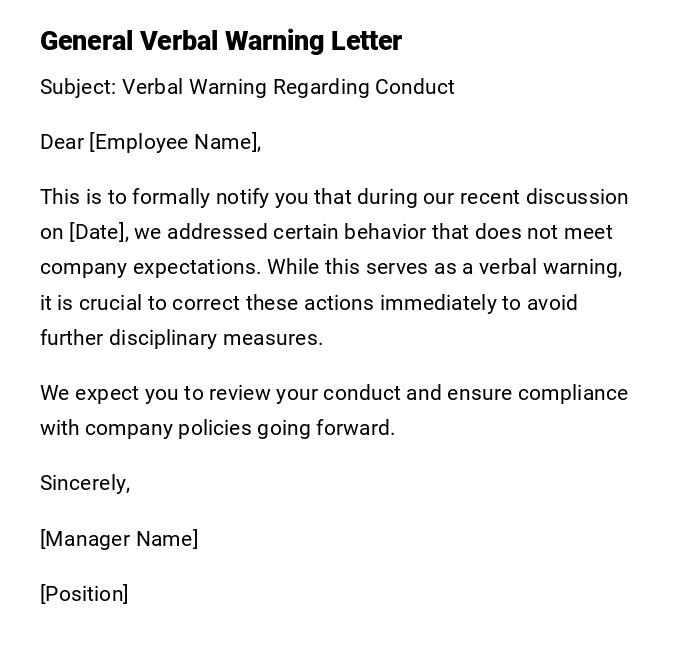
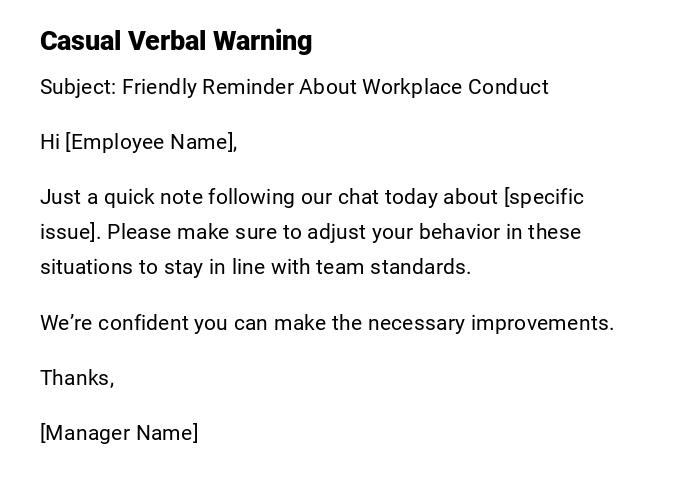
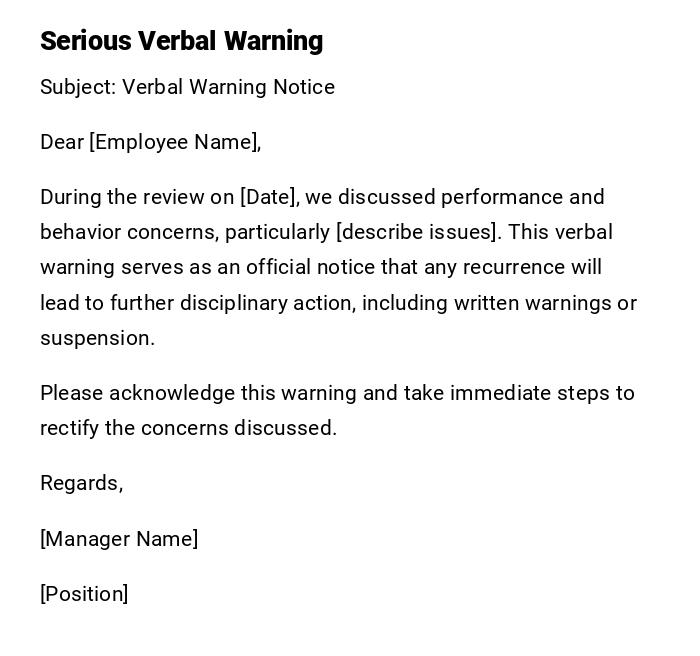
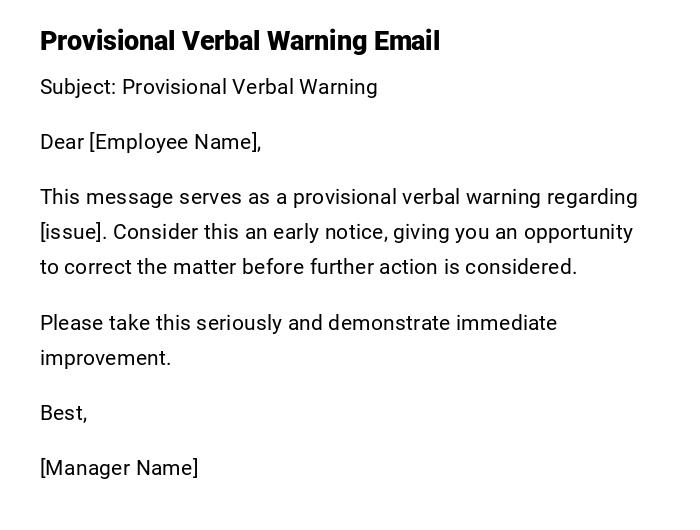
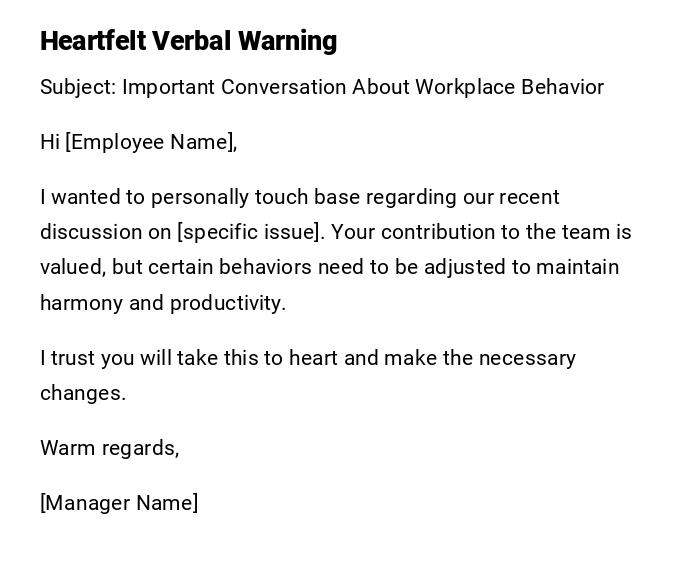

 Download Word Doc
Download Word Doc
 Download PDF
Download PDF